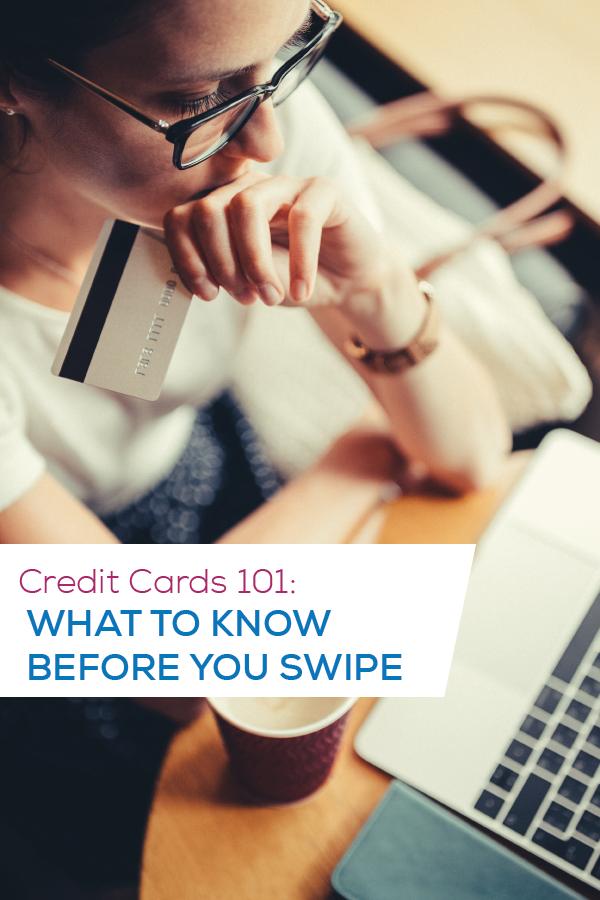Money Smarts Blog
Credit Cards 101: What to know before you swipe
Jan 9, 2017 ||

Wondering if a credit card is right for you? Or maybe you’re wondering how a credit card works… or what this whole “credit” thing is in the first place. . .
Well, you came to the right place.
So, what’s a credit card?
In the simplest terms, a credit card is a short-term loan given to a user (that’s you) in the form of a plastic card that can be used to pay for goods and services. Generally, the agreement is that you won’t be charged any additional fees/charges if you pay the borrowed amount back in full each month. But if you only pay a portion, you’ll be assessed finance charges – usually calculated as a percentage of the total amount you owe. Easy enough, right?
What’s the deal with credit limits?
A credit limit is NOT how much you can spend every day or every time you swipe your card. Basically, your credit limit is the maximum dollar amount you can carry as a total balance. It works like this:
If your credit limit is $1,000 and you charge $200 to your card, you can only spend another $800 before you’ve maxed out your card. If your card is maxed out, you can't charge anything else to it until you've made a payment (hopefully in full).
If you make no other purchases and pay off your full balance of $200, you have $1000 to spend after you make the payment.
Ok, but how does interest work?
When it comes to calculating interest, the main thing you need to know is your APR, or Annual Percentage Rate.
APR is the rate you can expect to pay yearly but, since interest is charged monthly instead of just once a year, the periodic interest rate is a little more helpful. You can learn more about how to get that number and how it affects your payment from our friends at Nerdwallet – they’ve broken down the whole complicated equation for you.
Why get a credit card?
Well, because if you’re smart about how you use it and don’t allow yourself to pile on a mountain of debt, a credit card can help build or improve your credit score. If you ever want to buy a car or house, you’ll need to have credit to get a loan.
Our best advice when it comes to credit cards is this:
- Only charge what you can afford to pay back in full each month. Whatever you don’t pay back will be subject to interest charges.
- Make whatever payment is due IN FULL every month.
- Limit usage to 30% of your credit limit to avoid any dings to you credit score for over usage.
Think you’re ready to start building credit with a credit card? Check out credit cards from IHMVCU, and apply online or at any branch when you've done your research.

Credit Cards 101: What to know before you swipe
Jan 9, 2017 ||

Wondering if a credit card is right for you? Or maybe you’re wondering how a credit card works… or what this whole “credit” thing is in the first place. . .
Well, you came to the right place.
So, what’s a credit card?
In the simplest terms, a credit card is a short-term loan given to a user (that’s you) in the form of a plastic card that can be used to pay for goods and services. Generally, the agreement is that you won’t be charged any additional fees/charges if you pay the borrowed amount back in full each month. But if you only pay a portion, you’ll be assessed finance charges – usually calculated as a percentage of the total amount you owe. Easy enough, right?
What’s the deal with credit limits?
A credit limit is NOT how much you can spend every day or every time you swipe your card. Basically, your credit limit is the maximum dollar amount you can carry as a total balance. It works like this:
If your credit limit is $1,000 and you charge $200 to your card, you can only spend another $800 before you’ve maxed out your card. If your card is maxed out, you can't charge anything else to it until you've made a payment (hopefully in full).
If you make no other purchases and pay off your full balance of $200, you have $1000 to spend after you make the payment.
Ok, but how does interest work?
When it comes to calculating interest, the main thing you need to know is your APR, or Annual Percentage Rate.
APR is the rate you can expect to pay yearly but, since interest is charged monthly instead of just once a year, the periodic interest rate is a little more helpful. You can learn more about how to get that number and how it affects your payment from our friends at Nerdwallet – they’ve broken down the whole complicated equation for you.
Why get a credit card?
Well, because if you’re smart about how you use it and don’t allow yourself to pile on a mountain of debt, a credit card can help build or improve your credit score. If you ever want to buy a car or house, you’ll need to have credit to get a loan.
Our best advice when it comes to credit cards is this:
- Only charge what you can afford to pay back in full each month. Whatever you don’t pay back will be subject to interest charges.
- Make whatever payment is due IN FULL every month.
- Limit usage to 30% of your credit limit to avoid any dings to you credit score for over usage.
Think you’re ready to start building credit with a credit card? Check out credit cards from IHMVCU, and apply online or at any branch when you've done your research.
